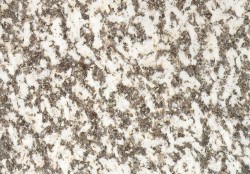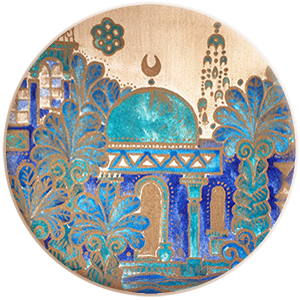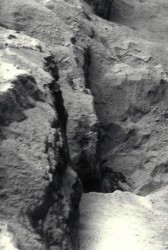
A Play. Scenes from Gusen
Premiere Semaine du Théâtre Autrichien à Paris 2009
The quotations from letters, witness reports and historical documents are authentic.
Prologue
PROJECTION
Advertising poster for the Topf company: “Ovens for Crematoriums.”
The image of an idyll. In the middle stands a chateau-like building. It is in a park, surrounded by trees. In the still water of the pond, the façade is reflected.A man with clothes and hairstyle from 1939 dictates a letter:
Man:
Our company, Topf and Sons, founded in Erfurt in 1878, possesses great, unrivaled experience. In 1914 we began building cremation ovens and since then we have remained market leaders. The method of constructing our ovens complies superbly with the criteria of piety and legal regulations for a dignified cremation. Topf cremation ovens are smoke free and odorless. The body of the deceased is protected from the furnace flames and exposed only to the highly heated air. Care is taken to provide sufficient oxygen and ample time so that the corpse disintegrates into ultrafine ash. Interference with the process of cremation is ruled out. The remains of the deceased are always identifiable and can be interred individually.
LIGHTS DOWN Music
The lyrical passages are taken from Jean Cayrol’s book of poetry “Alertes Aux Ombres,” written in 1944-45 in Mauthausen-Gusen.
PROJECTION
Fade-in. Images from a video camera. Subjective camera, recorded while walking, shaky.
Road. Town sign: GUSEN. Early morning, dawn light. As the stage grows brighter, the film grows dimmer.
Street. A tavern, closed. Menu board: FRIED POLLOCK with POTATO SALAD.
In the window, an adage embroidered on linen: HE WHO DOES NOT WORK, NEITHER SHALL HE EAT.
The girl Eve comes down the street. She stops, takes out a map, and studies it.
Jean is standing by the tavern, reading the menu board. He looks at Eve. She notices him.
Jean: Good morning.
Eve: Good morning. Gusen, that’s the name of the river I slept by last night. This village is called Gusen too. But I can’t find it on the map.
Jean: The town of Gusen is only rarely mentioned.
Eve casts an alert glance at him, but she doesn’t ask for an explanation and he says no more.
Jean: Are you traveling?
Eve: I’m walking. I’ve come a long way.
Jean: What’s your destination?
Eve laughs and shrugs her shoulders.
Eve: A place that doesn’t get mentioned. A voice I’ve often heard in my sleep. Do you write poetry?
Eve: Ein Ort, der nicht genannt wird. Eine Stimme, die ich schon im Schlaf gehört habe. Sie schreiben Gedichte?
Jean smiles.
Eve: It’s nice here. Beautiful country. The river and the hills. A village you could fall in love with.
Jean: The special thing about this place is the quarry.
Eve: A quarry?
Jean: The stone is granite. Gray and blue and smoke-colored, black and purple, it looks different in every kind of light. Sometimes you can see the color of blood, sometimes, when it snows.
Eve: Do you live here?
Jean: I’ve been here a long time and won’t ever leave. I used to think I could return to my homeland, which I yearned for, but then it turned out that I no longer have any place but this village. Since then I haven’t fought against it.
Eve: Your homeland?
Jean: A city, the city I was born in, Bordeaux. Paris, I lived there for many years. But no night has passed without me coming back here.
Eve: I know that city. Too bad we didn’t meet earlier. Bordeaux. I noticed something odd there, a mirage. Of a church. Noontime, an antique market. I ate couscous with lamb and drank wine. Maybe I drank too much wine. It was called Concorde. And then I saw something, a figure, maybe of a woman. The people laughed at me. I’ve forgotten what the church was called. Maybe it meant something significant. I you had been there …
Eve looks at Jean.
Jean: I might have laughed too.
Eve: And still you would have understood me.
Jean: People often think that. But usually it’s an illusion. There aren’t many like Papa Gruber.
Eve: How’s that?
Jean: People are no angels.
Eve: No.
Jean: Only some …
Pause.
Eve: What’s your name?
Jean: Jean.
Eve: I’m Eve Marie.
Jean: Bon jour, Eve Marie.
Eve: Farewell, Jean.
7. Szene. Collage von Ton – Licht – Wort
PROJEKTION Im Steinbruch.
Der Filmstill bleibt blass auf der Projektionsleinwand sichtbar.
Hackenschläge, Eisen auf Stein. Ein Peitschenknall. Laufende Schritte. Schnelle Atemzüge. Wind rauscht.
Stöhnen, Flüstern. Vielstimmig ein Wort: „Arbeit!“ Ein Kanon in verschiedenen Sprachen: deutsch, französisch, polnisch, italienisch, flämisch, holländisch, russisch, serbokroatisch…
Über die dunkle Bühne springen Lichtpunkte, Taschenlampe in der Dunkelheit, Reflexionen von Sonnenlicht.
Eindringlich gemurmelte, unverständliche Sätze. Dann Stille.
DUNKEL. Eine Stimme:
Stimme aus der Dunkelheit: Er schaute gern aus dem Fenster und beobachtete die Arbeiter im Steinbruch. Wenn er einen Moment der Untätigkeit feststellte, sprang er auf sein Motorrad und raste zu der Stelle hin. Schlendrian und Faulheit waren ihm verhasst. Wenn er den Häftling erwischte, zog er ihn zur Verantwortung. Er besaß ungemeine Körperkräfte. Mit einem Schlag ins Gesicht brach er gewöhnlich den Kiefer.
Musik
Le Figaro, Vorankündigung November 2009
Vendredi 20 novembre, c’est Anges de midi de Susanne Ayoub que l’on entendra. Une traduction de Henri Christophe (le nom de traducteur de Heinz Schwarzinger) d’un texte qui date de 2009. L’auteur est née à Bagdad en 1956 et vit depuis six ans à Vienne. C’est un auteur de romans, de poèmes, qui a énormément écrit pour la radio comme pour le théâtre, composé des scénarios, donné des tribunes aux journaux. Une femme très engagée qui a fondée sa propre compagnie de théâtre, Trio et qui a été récompensée par de nombreux prix.
Mittagsengel avait signé un court métrage, Mai à Mauthausen qui s’inspirait de la même figure, Jean Cayrol qui avait été interné en 1944 à Gusen, un camp de concentration près de Mauthausen, comme jeune résistant. Protégé, caché par ses camarades co-détenus sous la table de l’atelier, il écrit. Cinquante ans plus tard, Jean Cayrol publie ces textes : Alerte aux ombres.
C’est de ce destin et de ces textes que s’inspire Susanne Ayoub.


